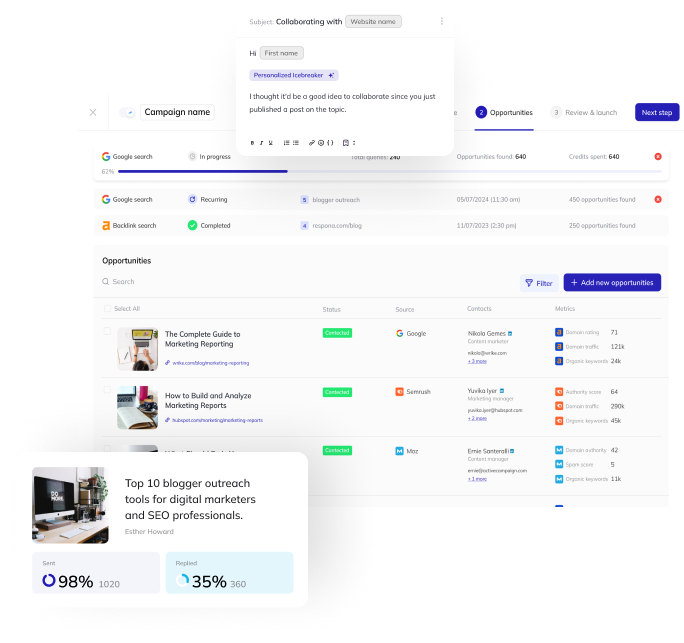Link exchanges are quite the buzzword in the world of SEO.
The big question around them is: should you do them?
The short answer is no.
The long answer is a little bit more complicated than that.
In this article, we’ll be taking a look at:
- What are link exchanges and how they can affect SEO
- What’s Google’s take on link exchanges
- The different types of link exchanges
- How to get backlinks ethically, and stay on Google’s good side
Let’s get into it.
Link building cheat sheet
What is a Link Exchange?
A “link exchange” is an agreement between two websites to provide each other with backlinks, in order to manipulate search rankings.
The most common type of link exchange is reciprocal: the classic “I’ll link to you, and you’ll link to me”, like on the screenshot below:
It has been an extremely popular link building method in the pre-Panda days, and is still pretty common today.
In order to understand why people do link exchanges, you need to delve into what is PageRank, and how it works.
Pagerank is a metric used to measure the relative importance of a web page within a website or collection of websites.
It is named after its inventor, Larry Page, one of the founders of Google.
Pagerank is used by the Google search engine to determine the relevance and importance of a particular page to a given query.
The higher the Pagerank of a page, the more likely it is to appear at the top of search engines results.
Pagerank is determined by the number and quality of inbound links that point to the page.
A link from a high-quality, authoritative website will provide more value than a link from a lower-quality website.
The more inbound links a page has, the higher its Pagerank will be. This makes link building an essential part of search engine optimization, as it helps to increase the Pagerank of a page.
When a page on a website has a link to another page on the same website, it passes some of its Pagerank to the other page.
This is known as ‘link juice’, and it helps to increase the Pagerank of the page it links to.
This is why it’s important to have a good internal linking structure within a website, as it helps to increase the Pagerank of all the pages on the website.
Link building is also important for passing Pagerank from page to page through external links.
When a page on a website links to another page on a different website, it passes some of its Pagerank to the other page.
This helps to increase the Pagerank of the page it links to and also helps to increase the visibility of the website in search engine results.
While there is no way to view your PageRank (not even with Google Analytics), it still lies at the core of Google’s algorithm, even in 2024.
In summary, Pagerank is a metric used by Google to measure the relative importance of a web page and is determined by the number and quality of incoming links to the page.
Link building is an essential part of SEO as it helps to increase the Pagerank of a page and pass Pagerank from page to page through link building.
Reciprocal link exchanges have been massively overused by webmasters, link builders, and SEO people.
So, Google has released countless updates in order to combat “link spam”, with reciprocal links being one of the tactics affected.
While one or two direct exchanges won’t hurt you, excessive link exchanges will.
This brings us to the next section.
Google’s Stance On Link Exchanges
If you’re planning on investing in link building, you need to be aware of what classifies as a “link scheme”.
According to Google, all of the following qualifies as a “link scheme”, or link spam:
- Link exchanges, and exchanging goods or services for links
- Automated link building (such as comment bots)
- Advertisements with links that are not marked as “sponsored”
- Bookmark site links
- Widely-distributed links in footers and widgets
- Other hidden, excessively keyword-rich, or misleading links
So, Google is very much against link exchanges.
What happens if you participate in them? A lot of people believe that you will get a Google penalty, which will hurt your website’s rankings or even prevent it from appearing in search results whatsoever.
However, this is very unlikely.
If done on a small scale (a few reciprocal exchanges), you won’t get penalized.
With that being said, you won’t benefit from a reciprocal link exchange, either.
Google’s algorithm is exceptionally good at picking up these links. In its eyes, two links from previously unrelated domains to each other appearing within a short period of time is a tell-tale sign that something shady may be going on.
What happens next is both these links are excluded from the algorithm.
This means that they don’t actually pass on any PageRank, and don’t benefit either of the websites in any way.
So, investing into reciprocal link exchanges is essentially a waste of time and resources.
However, there are several other types of exchanges, which can be a little more worthwhile.
Types of Link Exchanges
Now, let’s take a look at some other types of link exchanges.
Reciprocal Exchanges
The old “Link to me and I’ll link to you” scheme is mostly a waste of effort as stated above, however, these types of links are not entirely useless.
Even though they don’t actually help you from an SEO standpoint, if you manage to get a reciprocal link on an extremely authoritative website in your niche, it can lead a chunk of extremely valuable referral traffic to your website, not to mention the brand awareness benefits that come along with it.
PBNs
PBN links are to avoided at all costs.
A Private Blog Network (PBN) is a network of blogs held by the same website owner.
The purpose of a PBN is to create links to a website to increase its search engine rankings.
Links from PBNs are generally considered to be a form of link scheme, which is a black-hat SEO tactic.
By using PBN links in an attempt to improve your rankings, you’re running a huge risk of getting penalized by Google.
This penalty will massively lower your search engine results rankings, or prevent your website from appearing in Google at all.
Image source: E Business Blog
So, how can you spot a PBN to avoid it?
- Check the domain registration details and IP addresses
PBNs are often registered to the same person or organization. If the domains have similar registrant information, such as a name or email address, this is a sign that they could be part of a private blog network.
Additionally, if multiple sites are hosted on the same IP address, this could indicate that they are part of a PBN.
- Examine the content
PBNs often contain low-quality content that is not relevant to the target website. If the content on the site is poorly written and not related to the target website, this could be a sign that the site is part of a PBN.
PBNs often use keyword-stuffed anchor texts to link back to the target website. If the anchor texts are overly optimized, this could be a sign that the site is part of a PBN.
- Check for unnatural link patterns and keyword-stuffed anchor texts
Unnatural outbound link patterns, such as an unusually high number of links from a single source, overly-optimized anchor texts, or links from a limited number of domains are suspicious.
On their own, these patterns don’t indicate that a website is a PBN, but even if a resource is not a PBN but shows signs of unnatural links patterns, it’s not a good idea to reach out to them for link building, as the value of any backlinks you’ll get from them will be greatly diluted.
Guest Post Exchanges
As you may have guessed by the name, a guest post exchange is similar to link swaps – except it has to do with publishing entire articles on each other’s sites.
If there are any reciprocal links in these guest posts, they will be excluded from the algorithm.
However, if there are links to other websites (not your own) in a guest post that you publish on another site that has also published an article on yours, they should not be de-valued.
Image source: Bulk.ly
So, for example, through a guest posting exchange, you’re able to build links for a partner website, or another resource of yours.
In essence, this would make for a 3 way link exchange, which we’ll discuss in the section below.
In addition to the ability to provide a third-party website wih a quality backlink, guest post exchanges are also a great way to establish thought leadership within your niche.
Publishing tons of helpful, knowledgeable content with your name attached to it is a great way to spread the word about you and your business, and show off your expertise on a particular topic.
3-Way (A-B-C Link Exchanges)
3-way, or A-B-C link exchanges are arguably the safest and most common way to exchange online links in 2024.
In this case, website A links to website B, and then site B links to site C.
It’s safer than reciprocal link exchanges because there is no way for Google to track an A-B-C link exchange.
So, 3-way links actually pass on PageRank, making it the most popular link exchange method in 2024.
Technically, it still qualifies as a link scheme – but one that’s extremely hard for Google to identify and combat.
There are two ways you can go about securing a 3-way link exchange:
- If you have another website or a link building partner, you can provide your prospect with a link from there, while getting a backlink for your own resource
- If you’re writing guest posts for other resources, you can reach out to people, offering them links from your upcoming content
The first option is quicker, but the second is more valuable to you: you will both be publishing a guest post, and getting a link from a quality site.
Not to mention that, a lot of the time, you can fit multiple partner links into your guest posts, and receive more links yourself as a result.
How to Get Backlinks Ethically?
So, if link exchanges are against Google’s guidelines, how do you go about link building?
What if we told you there’s actually a way that’s approved by Google themselves? More specifically, John Mueller:
So, an “ethical” way of building links to your content is to first create something that people will want to read, and then reach out to them, letting them know about it.
But, in reality, almost nobody will ever link to another person’s blog post for free, so you need to include some sort of incentive in your pitch.
Such an incentive can be a 3-way link exchange: offer your prospects a link from either a partner website of yours, or an upcoming guest post that you have.
But you didn’t hear that from us.
Even though Google can’t track these exchanges, they still classify as “link schemes”.
And since they’re virtually untrackable, Google can’t stop link builders all around the world from setting them up.
Now, let’s do a step-by-step walkthrough of preparing and running a link building outreach campaign with the anchor text link building strategy – its premise is to find non-competing articles that mention your target keyword somewhere in the content, and then asking them to add your link on it.
Create Link-Worthy Content
You can’t build links if you don’t have any content.
In theory, you could try building backlinks to your home and product pages, but in reality, nobody will link to them for free.
And the sites that would agree to such an arrangement are low quality links spam sites anyway, so links from those don’t hold any SEO value.
We already have over a hundred blog posts, so let’s pick one for our example.
Say, our guide on building a strong SEO strategy:
It’s a comprehensive post that we’re quite proud of, and covers and extremely broad keyword, so we shouldn’t have any difficulties finding link building prospects.
Create your campaign
To find link building prospects (and manage all further steps of the entire process), we will be using Respona and it’s built-in functionality.
It comes with pre-designed campaign templates for different link building strategies – as well as an automatic search mode that enables you to run several queries at the same time, and adds all relevant sites directly into your outreach campaign without much manual input.
For this example, we’ll be using the blogger outreach campaign template – the goal of which is to find relevant bloggers in your niche that have recently published content about your topic.

To use it, all you need to do is fill out two simple fields: your target keywords and an incentive for your prospect to collaborate (such as a slot in your upcoming guest post).
We also used Respona’s AI keyword research suggestions to come up with 20 additional keyword ideas related to SEO.
When done, click “Use this template” to create the campaign and get into the editor.
Prepare Your Sequence
Now, it’s time to prepare your email sequence.
Every campaign template comes with a pre-designed email template but we encourage you to experiment and create your own.
Since we’re doing link building, an ideal email sequence would consist of two messages: the initial pitch and one follow-up.
Many junior link builders make the mistake of following up too much, too often. However, these excessive follow-ups only increase your chances of getting flagged as spam, so we advise keeping it brief, and respect your prospects’ time.
Here is the exact template that we have found works pretty well for this strategy:
Hi first_name | there,
Icebreaker
I’m writing a guest article about outreach tips and would love to give you a mention.
I thought it’d be a good idea to exchange links since you just published a post on the topic.
Is that something you’d be interested in?
The reason why it works so well is that the value proposition is all the way in the front.
The prospect immediately knows that by collaborating with you, they have the potential of getting a link from a high-quality website.
It also includes an AI icebreaker variable that generates unique personalizations for every opportunity in your campaign, increasing your reply rates.
Notice how in the template, the “ask” is the second to last line? By putting your ask after your value proposition, you’re greatly increasing the chances of getting a response.
Adding a follow-up is simple: just click on the “Create new step” button at the bottom of the email editor.
Once the sequence is complete, move on to the next step.
Find Link Building Opportunities & Email Addresses
Respona automates the prospecting and email finding process almost entirely.
Since we used a campaign template and entered our keywords at the first page, our search is already all set up.
Respona automatically applied the inurl:blog search operator to all our keywords to make sure all opportunities are part of a blog.

Click “Continue” and add some additional SEO metrics to narrow down the results to websites that are viable for us to collaborate with.
Click “Continue” once more to review the contact finder settings.
Since we used a campaign template, it’s already locked in to find content and SEO managers, content marketing and digital marketing managers, and other personnel that could be relevant for link building collaborations.

In the next field, we can provide some additional instructions to the AI personalizer to make it sound more like you.
You can also change the algorithm and train it on examples of your previous personalizations.
The last option available on this screen makes the search recurring. When enabled, Respona will automatically re-run the search and add fresh opportunities directly to your campaign.
Click “Run automation” and Respona will look for link building opportunities, their contact information, and personalize your pitches – all in the same go.

As soon as results are found, they will start appearing on the screen.
No need to wait for the whole search to be complete – it’s completely in the cloud and you’re free to move on to another campaign or task.
Respona will send you an email once it’s complete.
Personalize Your Pitches
Un-personalized mass email blasts are a thing of the past, and a great way to get yourself ignored, if not sent directly to spam.
To increase your reply rates, it’s important to include at least a little bit of personalization in every single one of your link building pitches.
In this step, Respona will populate all variables you used in your sequence. But we highly encourage you to make manual edits as well.

Before launching your campaign, Respona will also run a final round of verifications to make sure none of your pitches have placeholders, or unfilled variables, and you’re not trying to reach out to any recent contacts.

Link building cheat sheet
Now Over to You
So no, you should not participate in link exchanges (unless it’s a safe, virtually invisible to Google A-B-C exchange).
A better way to go about link building is to create strong, link-worthy content and reach out to other people in order to promote it.
Manually managing the link building outreach process is a ton of work, so if you need any help speeding it up, don’t hesitate to start your 14-day free trial with Respona to see how we can help!
Frequently Asked Questions (FAQ)
Are link exchanges bad for SEO?
Small-scale link exchanges are not bad for your SEO. However, they’re not “good” either, as reciprocal linkk building is picked up and de-valued by the Google algorithm, which prevents them from passing any PageRank or other search engine ranking signals.
The consensus between SEO experts is that you should avoid investing into a direct link exchange strategy.
What should you do instead of link exchanging?
According to Google’s own John Mueller, a better way of building backlinks is to create great content and reach out to other bloggers, letting them know about it and why they might like it.
Can reciprocal links still have value?
It depends on the site that’s linking to you. Reciprocal links from highly-authoritative websites in your niche can still be valuable, as they help establish thought leadership and brand awareness.
On the contrary, reciprocal links from spammy, low-quality resources do not hold any value.
I’ve been doing link exchanges for a few months now. Am I going to get a penalty?
Once again, it depends on the scale at which you’ve been doing it. Several dozen reciprocal links over a course of a few months likely won’t hurt your SEO in any way, but hundreds of reciprocal links appearing on various sites within a short span of time will likely attract Google’s attention, possibly leading to a manual review of your resource or even a penalty.
A natural links profile is going to have at least a few reciprocal links anyway, as they can occur without your knowledge.



![2455 Guest Posting Sites for 2024 [Updated List]](https://respona.com/wp-content/uploads/guest-posting-sites-1024x683.jpg)



